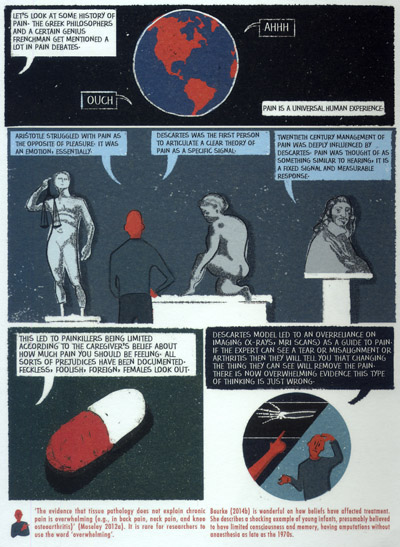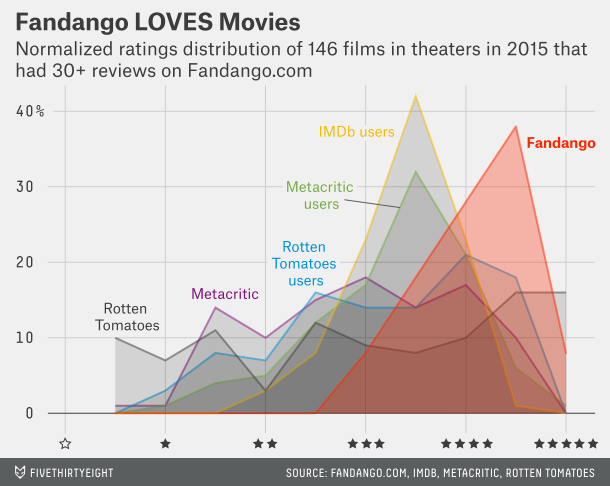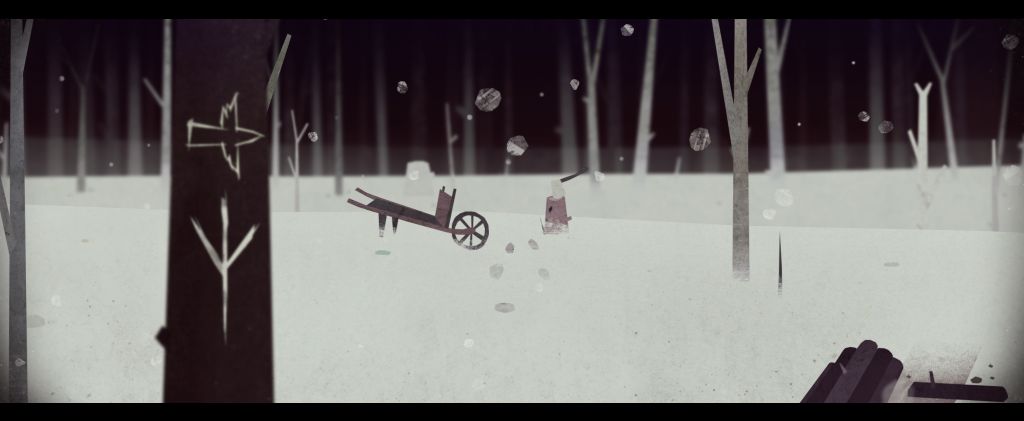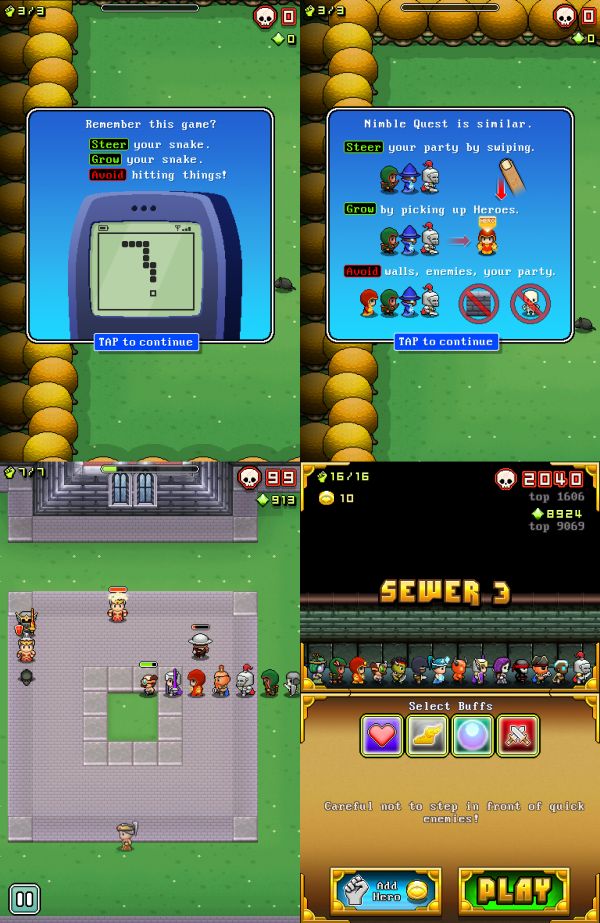Movie Rating Distribution
Walt Hickey was curious about the ratings on Fandango (which are clearly suspect), but in his investigation he brought together this nice collection of rating distribution data:
Just as I found when considering the ratings of animated movies, IMDB ratings tend to span around 5.5 to 8.3, whereas Rotten Tomatoes actually spans 0% to 100%.
Check out the whole thing to discover some of Fandango’s shenanigans.
Pain is Really Strange
For excellent research and presentation of a complex and important topic, I highly recommend the comic Pain is Really Strange by Steve Haines and illustrated by Sophie Standing:

The key insight is that pain (and particularly chronic pain) does not correlate reliably with tissue damage, with psychological / neurological factors also playing a huge part. I was particularly interested to find out that the term “slipped disc” is not only innaccurate, but can actually cause a patient to experience more pain than if a more benevolent-sounding term is used!
I give this the Thing of the Month award. Go check it out on the publisher’s site or put it on a Christmas wishlist at Amazon.
(Also just out, Trauma is Really Strange, which I assume to be similarly good).
Mobile Game: Horizon Chase
https://www.youtube.com/watch?v=JrfuIKYrfyQ
If you enjoyed any racing games from the 80s or early 90s, Horizon Chase is a brilliant throwback to the gameplay of that era. You can buy it on iOS, or, in a fascinating nod towards the different store design that represents a whole other subject I’ll get to one of these days, you can get the first few levels for free before paying to unlock the rest on Android.
Three things to know:
- Features fake driving physics, which is more fun than real driving physics! (I found the article about how they achieved this quite fascinating).
- Your car has a slower acceleration but faster top speed than all the others! This means every race is about overtaking your way from last place to first, which is the most fun thing.
- The soundtrack is chiptune-tastic and by Barry Leitch if that means anything to you.
Empathy vs. the Viral Straw Men
Empathy: Understanding the experience of others.
Othering: Explicitly or (more often) implicitly suggesting a group or particular person is somehow “different”, with intent to slightly turn the listener against that group/person.
These two concepts are often tied up with our tribe-like identities: when someone we consider to be “one of thus” says something, we tend to empathise; when someone from an opposing tribe says something, we consider them ‘Other’ and tend towards the opposite of empathy – I don’t see a good term for it but we could call it “expathy”.
The Daily Mail provides regular examples of this. News stories about people the paper wants us to feel sympathy for will emphasise the traits that align them with the presumed Mail readership’s tribal identity: atomic families, hard-workers, church-goers. Stories that tilt the opposite way will make note of how their subjects differ from this group: single mums, people on benefits, followers of other religions or atheists. Describing a group of people as a “swarm” is an Othering technique.
As is often the case, it’s easier to see this mechanism at work in others than ourselves. A liberal encountering a conservative expressing their views on wealth redistribution might demonstrate expathy by assuming the conservative hates poor people, worships money, and is selfish – but the conservative may be none of those things, and genuinely believe that if policy reflected their views perfectly, everyone that truly “deserves” success would get it. (You can tell I’m a liberal and still can’t shake the expathy from the distancing quotation marks).
Similarly, a conservative encountering a liberal expressing their views on wealth redistribution demonstrates expathy when they assume the liberal is blind to real-world complications, and/or that they are some kind of Western-society-hating communist.
If you want to understand someone and possibly even try to change their mind, empathy rather than expathy seems a good place to start. I think this is what lies behind the quote:
Darkness cannot drive out darkness; only light can do that. Hate cannot drive out hate; only love can do that
– Martin Luther King, Jr
If you need more practical advice on how to do that, Daniel Dennett has it:
1. Attempt to re-express your target’s position so clearly, vividly and fairly that your target says: “Thanks, I wish I’d thought of putting it that way.”
2. List any points of agreement (especially if they are not matters of general or widespread agreement).
3. Mention anything you have learned from your target.
4. Only then are you permitted to say so much as a word of rebuttal or criticism.
I think this is particularly important as the tribe-shaping influence of social media means that content which mocks straw-man versions of opponents’ views goes viral but only serves to polarise us and silence meaningful debate.
Digital Culture update: Music Industry Seems Fine Actually
I’ve been very curious to know the impact the internet has had on the music industry now that the dust has somewhat settled. More importantly, how are the actual musicians doing? John B sends in this NY Times article which does a wonderful job of rounding up the pertinent data (for the US at least), and finds that things are actually looking pretty good.
Things updates: Propellers and Music
Back in Things 80 (September 2010) I shared a surreal photo of a spinning propeller generated by the rolling shutter effect. Richard sends in a link to these lovely animations that make this process much clearer!
After discussing various ways music can be reworked last month, people continue to send in interesting examples.
Deb sends in a rare example of the ‘remix’ in which the lyrics are the only part that has been preserved, with Tom Basden’s version of Mamma Mia:
For my part, I realised I forgot one of my all-time favourites, The Apples’ jazzy instrumental take on Rage Against the Machine’s famous Christmas number 1, Killing in the Name:
Laurence points to the strange outlier that is the French version of the A-Team theme tune, complete with weird lyrics. He further provides an example concatenating as many examples of reworking as possible in a series with Hooked on a Feeling, which I paraphrase here:
- The original is by B.J. Thomas
- This was … somethinged … and had the ‘ooga chaka’s added by Blue Swede (This is the version that most people know from ‘Reservoir Dogs’ and ‘Guardians of the Galaxy’.)
- The Blue Swede version was covered by David Hasselhoff
- And the Hasselhoff version was relyriced by David A. Scott of Literal Video:
Is it possible to find a longer string, or one covering more types of rework?!
– Transmission finally ends







